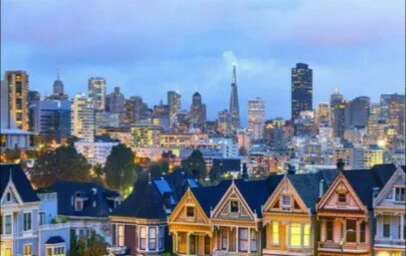Sustainable City, San Francisco
San Francisco, United States, stands as a beacon of sustainable urban living and innovation. Renowned for its commitment to environmental consciousness and progressive policies, the city sets a remarkable example for others aspiring to build a sustainable future.
San Francisco's dedication to sustainable transportation is evident in its extensive network of bike lanes, pedestrian-friendly streets, and efficient public transit systems. The city encourages its residents to choose greener alternatives by promoting cycling, walking, and the use of electric vehicles. Initiatives such as the Bay Area Bike Share program and the construction of electric vehicle charging stations demonstrate San Francisco's determination to reduce carbon emissions and alleviate traffic congestion.
In addition to transportation, San Francisco is at the forefront of renewable energy adoption. The city actively supports clean energy initiatives and has implemented policies to promote the use of solar power, with many buildings and homes equipped with solar panels. By harnessing the power of the sun, San Francisco reduces its reliance on fossil fuels and contributes to a more sustainable energy grid.
San Francisco's waste management practices are also commendable. The city boasts one of the highest recycling rates in the United States and has implemented comprehensive composting programs. Through education and infrastructure, San Francisco encourages residents and businesses to reduce, reuse, and recycle, minimizing the amount of waste sent to landfills.
The sustainable achievements of San Francisco would not be possible without the collective efforts of its environmentally conscious community, innovative businesses, and forward-thinking policymakers.
By prioritizing sustainable practices in transportation, energy, waste management, and preserving green spaces, San Francisco continues to shine as a model for other cities around the world striving for a more sustainable and livable future.
Outlook Sustainable City Spotlight: San Francisco, United States
Public Transportation and Car-Free Initiatives
San Francisco is renowned for its robust public transportation system, which encourages residents and visitors to opt for greener modes of travel. The city's extensive network of buses, light rail, and cable cars provides convenient and eco-friendly alternatives to private vehicles. Additionally, San Francisco has implemented innovative car-free initiatives such as the closure of certain streets to traffic, creating pedestrian-friendly zones and promoting cycling as a means of transportation.
Renewable Energy and Green Infrastructure
San Francisco has made significant strides in transitioning to renewable energy sources. The city has set ambitious goals to achieve 100% renewable electricity, and initiatives like the GoSolarSF program promote solar panel installation on residential and commercial buildings. Furthermore, San Francisco has implemented green infrastructure projects, including green roofs and rainwater harvesting systems, to manage stormwater runoff and enhance the city's overall sustainability.
Zero Waste and Recycling Programs
San Francisco has established itself as a leader in waste management and recycling efforts. The city has implemented a comprehensive zero waste program, aiming to divert all waste from landfills by 2020. San Francisco residents are encouraged to participate in composting and recycling programs, and the city has stringent recycling requirements for businesses and multi-unit dwellings. Through these initiatives, San Francisco is reducing waste generation, conserving resources, and promoting a circular economy.
Urban Farming and Community Gardens
In an effort to foster local food production and community engagement, San Francisco embraces urban farming and community garden initiatives. The city supports the development of rooftop gardens, urban agriculture projects, and community-managed gardens, providing residents with opportunities to grow their own food and connect with nature. These initiatives not only contribute to sustainable food production but also promote neighborhood cohesion and well-being.
Green Building and Energy Efficiency
San Francisco has embraced green building practices and energy efficiency standards to reduce the environmental impact of its built environment. The city mandates energy audits and efficiency upgrades for large buildings, and green building certifications, such as LEED (Leadership in Energy and Environmental Design), are encouraged. San Francisco also promotes the use of sustainable materials and the incorporation of energy-saving technologies in new construction projects, leading the way in sustainable urban architecture.
Climate Resilience and Adaptation
Given its coastal location and vulnerability to climate change impacts, San Francisco is actively working towards building climate resilience. The city has developed strategies to address sea-level rise, including shoreline protection and flood mitigation measures. San Francisco also invests in green infrastructure to enhance the city's ability to adapt to extreme weather events. By prioritizing climate resilience, the city is taking proactive steps to safeguard its future and the well-being of its resident
San Francisco's commitment to sustainability has positioned it as a model for other cities striving for greener and more livable urban environments. Through its emphasis on public transportation, renewable energy, waste management, urban farming, green building practices, and climate resilience, San Francisco showcases the potential for sustainable living in a densely populated urban setting. As climate change and environmental challenges loom large, San Francisco's proactive approach offers valuable lessons and inspiration for cities worldwide.


